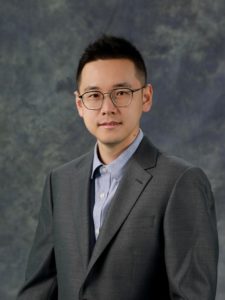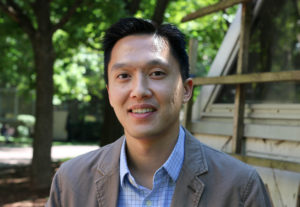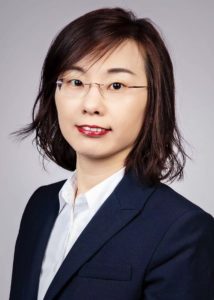 Dr. Dongshi GUAN is a Professor at the Institute of Mechanics at the Chinese Academy of Sciences and a Professor at the School of Engineering Science at the University of Chinese Academy of Sciences. He received his PhD in Physics from Hong Kong University of Science and Technology (HKUST) in 2016. During 2014-2015, Guan was a Visiting Scholar at the Laboratoire Interdisciplinaire de Physique in Grenoble, France. After graduation, he was a Postdoctoral Fellow in the Department of Physics at HKUST, and subsequently became a Research Assistant Professor and was honored with an IAS Junior Fellowship in 2017. After joining the Institute of Mechanics in 2019, his research group has focused on experimental investigation of micro- and nano-scale liquids at interfaces in soft and living matter systems, such as dynamics of moving contact line, mechanism of phase-separated protein droplets, and mechanical properties and active behavior of living cells and tissues.
Dr. Dongshi GUAN is a Professor at the Institute of Mechanics at the Chinese Academy of Sciences and a Professor at the School of Engineering Science at the University of Chinese Academy of Sciences. He received his PhD in Physics from Hong Kong University of Science and Technology (HKUST) in 2016. During 2014-2015, Guan was a Visiting Scholar at the Laboratoire Interdisciplinaire de Physique in Grenoble, France. After graduation, he was a Postdoctoral Fellow in the Department of Physics at HKUST, and subsequently became a Research Assistant Professor and was honored with an IAS Junior Fellowship in 2017. After joining the Institute of Mechanics in 2019, his research group has focused on experimental investigation of micro- and nano-scale liquids at interfaces in soft and living matter systems, such as dynamics of moving contact line, mechanism of phase-separated protein droplets, and mechanical properties and active behavior of living cells and tissues.
Read Dongshi Guan’s Emerging Investigator article: http://xlink.rsc.org/?doi=10.1039/D3SM00592E
How do you feel about Soft Matter as a place to publish research on this topic?
Soft Matter provides a unique forum for communicating significant advances in interdisciplinary soft matter research and is well-regarded within the scientific community. It is a great place to publish our Emerging Investigator article on the mechanical response and relaxation behavior of hydrogels. In the article, we report systematic atomic-force-microscopy (AFM) measurements of stress relaxation and crossover behavior of agarose hydrogels. By examining the interplay between poroelasticity and viscoelasticity in hydrogels at the micron level, we can gain insights into the mechanical response of living cells and tissues when subjected to deformation. This work thus represents a breakthrough in our understanding of the mechanical response and relaxation behavior of soft hydrogels and establishes a meaningful connection between soft matter physics and biological science.
What aspect of your work are you most excited about at the moment and what do you find most challenging about your research?
Being trained as a soft matter physicist, I am excited about my research gradually became involved with interdisciplinary research on biological systems, which would help unravel the mysteries of life. Although science is often taught as if the various disciplines were clearly separate, exciting things can happen when the boundaries blur. The study of soft matter is one emerging field that has received increasing interdisciplinary attention from researchers in physics, chemistry, mechanical engineering, and life science. Living cells, as particular forms of soft material, exhibit unique mechanical properties closely related to their activities, functions, and health. A major challenge to the experimental study is that the cells are extremely soft, delicate, and surrounded by a liquid medium. In my research, I use the AFM as a microscopic “finger” to detect soft material surfaces and living matter, such as fluid interfaces, hydrogels, cells and tissues, to study their mechanical properties and underlying physics. I aim to develop new techniques for studying micro- and nano-scale liquids and cells at interfaces and better understand living matter from a physicist’s viewpoint.
In your opinion, what are the most important questions to be asked/answered in this field of research?
Accurately measuring the mechanical properties of living cells is crucial in understanding their microscopic origins and how they relate to cell responses and functions. However, living cells have complex structures and exhibit a variety of viscoelastic behaviors at different scales. Hydrogels share many similarities with cells, making them an ideal model to investigate the relaxation and crossover behavior of living matter. In our previous work, we obtained a unified quantitative description of the compressive modulus of individual living cells and provided a digital spectrum of mechanical readouts that are closely linked to the hierarchical structure and active stress of living cells. In this Emerging Investigator article, we further prove this unified description by relatively simple polymeric systems and demonstrate that hydrogels can serve as a model to investigate the relaxation and crossover behavior of living matter.
Can you share one piece of career-related advice or wisdom with other early career scientists?
My advice for early career scientists in the field of soft matter is to actively build interdisciplinary network and collaborate with peers and experts in different fields. Working together with scientists from different fields can bring about fresh perspectives and approaches to tackle complex scientific issues. Furthermore, seek out mentors who can offer guidance and support as you navigate your early career. I greatly benefit from discussions with Prof. Penger Tong, Prof. Elisabeth Charlaix, and Prof. Masao Doi.
Find out more about his work via: https://people.ucas.edu.cn/~guandongshi?language=en
 Dr. Scott Tsai is the Director of the Graduate Program in Biomedical Engineering, and a Professor in the Department of Mechanical and Industrial Engineering at Toronto Metropolitan University. His undergraduate training in Mechanical Engineering is from the University of Toronto, and his masters and PhD degrees in Engineering Sciences are from Harvard University. Dr. Tsai’s laboratory specializes in droplet and bubble microfluidics. His group also collaborates actively with hospital researchers to implement these technologies in medical applications related to lung disease and prostate cancer. Dr. Tsai is a recipient of the United States’ Fulbright Visiting Research Chair Award, Government of Ontario’s Early Career Researcher Award, and Toronto Metropolitan University’s Deans’ Teaching Award.
Dr. Scott Tsai is the Director of the Graduate Program in Biomedical Engineering, and a Professor in the Department of Mechanical and Industrial Engineering at Toronto Metropolitan University. His undergraduate training in Mechanical Engineering is from the University of Toronto, and his masters and PhD degrees in Engineering Sciences are from Harvard University. Dr. Tsai’s laboratory specializes in droplet and bubble microfluidics. His group also collaborates actively with hospital researchers to implement these technologies in medical applications related to lung disease and prostate cancer. Dr. Tsai is a recipient of the United States’ Fulbright Visiting Research Chair Award, Government of Ontario’s Early Career Researcher Award, and Toronto Metropolitan University’s Deans’ Teaching Award. 











